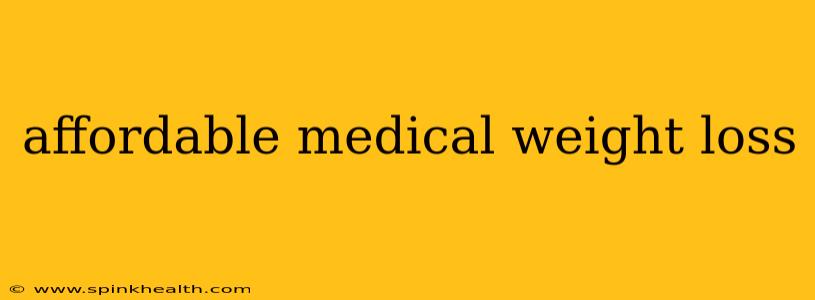The journey to a healthier weight can feel daunting, especially when considering the cost of medical weight loss programs. But what if I told you that achieving your weight loss goals affordably is possible? This isn't about quick fixes or fad diets; it's about sustainable, medically-sound strategies that fit your budget. Let's embark on this journey together, exploring the options available and demystifying the process of achieving a healthier, happier you without breaking the bank.
What are the different types of affordable medical weight loss programs?
The term "affordable" is subjective and depends on individual circumstances. However, numerous options exist that provide medical supervision and support without the exorbitant price tags of some exclusive clinics. These might include:
-
Primary Care Physician Involvement: Often, the most accessible and affordable option is working directly with your primary care physician. They can provide guidance on diet, exercise, and potential medication if appropriate. While they may not offer comprehensive weight loss programs, their involvement forms a crucial foundation for safe and effective weight management.
-
Telehealth Programs: The rise of telehealth has revolutionized access to healthcare, including weight loss. Many online programs offer consultations, support groups, and personalized plans at significantly lower costs than in-person clinics. These often utilize technology to track progress and provide ongoing support.
-
Community Health Centers: Community health centers are non-profit organizations that offer affordable healthcare services, including weight management programs. These centers often have sliding scales based on income, making them accessible to a broader population.
-
Group Programs: Participating in group weight loss programs can be more cost-effective than individual programs. The shared experience and support network can significantly impact success.
How can I find affordable medical weight loss programs in my area?
Finding affordable options often involves some research. Start by:
-
Checking with your insurance provider: Many insurance plans cover some aspects of weight loss treatment, such as consultations with a registered dietitian or certain medications. Understanding your coverage can drastically reduce out-of-pocket expenses.
-
Searching online directories: Websites dedicated to healthcare providers allow you to filter by services offered and cost, helping you locate clinics and programs within your budget.
-
Contacting local community health centers: Reaching out to these centers directly is a great way to inquire about their weight loss programs and financial assistance opportunities.
-
Asking for recommendations: Friends, family, and your primary care physician may be able to suggest affordable and reputable programs in your area.
What are the common costs associated with medical weight loss programs?
The cost can vary drastically depending on the type of program you choose. Expect to encounter expenses such as:
-
Initial consultation fees: These fees cover the initial assessment and development of a personalized plan.
-
Ongoing monitoring and follow-up appointments: Regular check-ups are crucial to track progress and adjust the plan as needed.
-
Medication costs (if prescribed): Weight loss medications, when medically necessary, can add to the overall expense.
-
Nutritional counseling fees: Registered dietitians can provide personalized dietary guidance, but their services may come with an additional cost.
What are some affordable weight loss strategies I can implement at home?
Before jumping into costly programs, consider these budget-friendly steps:
-
Adopting a balanced diet: Focus on whole, unprocessed foods like fruits, vegetables, lean proteins, and whole grains. Meal prepping can significantly reduce food costs and increase healthy eating habits.
-
Regular exercise: Walking, jogging, or cycling are free or low-cost ways to incorporate physical activity into your daily routine.
-
Tracking your food and exercise: Utilizing free apps or journals can help monitor your progress and stay accountable.
-
Seeking support: Joining online communities or finding a weight loss buddy can provide encouragement and motivation.
Is it worth it to invest in a medical weight loss program?
The decision to invest in a medical weight loss program depends on your individual needs and circumstances. If you've struggled with weight loss on your own, the guidance and support provided by a medical professional can be invaluable, even if it means a financial investment. The long-term health benefits and improved quality of life often outweigh the initial costs. However, weighing your options and considering the affordable alternatives mentioned above is essential before committing to any program. Remember, achieving a healthier weight is a journey, not a race, and finding a sustainable, affordable approach is key to long-term success.

